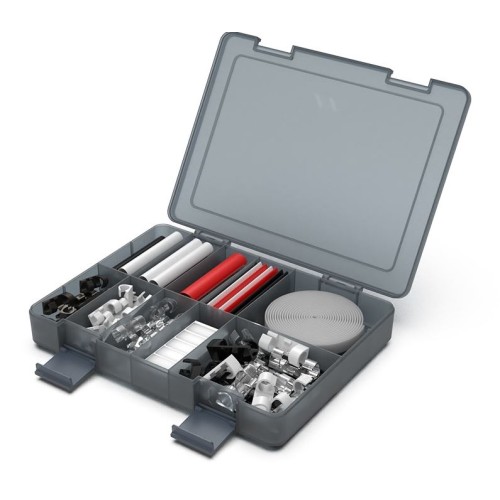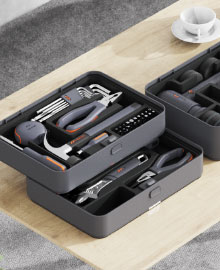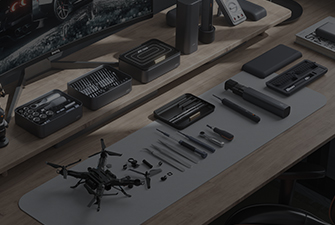
A fully equipped tool chest is a tradesperson's prime asset for essential work like checking wood and driving screws with precision. This overview supplies skills to pick suitable tools and harness them effectively.
- Kick off by assembling key hand tools including hammers, screwdrivers, adjustable wrenches, pliers, saws, and tapes.
- Get acquainted with each tool's purpose and its particular applications.
- Polish your approach by working on hands-on tasks and boosting complexity over time.
Keep remembering that honing hand tool skills is an investment in ability. With adequate know-how, tools will amplify your capacity to tackle demanding tasks with accuracy.
Empower Your Workshop with Power Tools
Keen to revolutionize tasks? Dive into strong tools that marry precision and operational speed. These must-have tools can change the game for professionals and casual builders alike. From heavy-duty drills to intricate saws, power tools offer a spectrum of capabilities to tackle any construction project with ease.
- Try cordless impact drivers to speed fastening and demolition operations.
- Master reciprocating saws for quick and clean cuts through wood, metal, and more.
- Enhance woodworking using robust planers and jointers to attain precise smooth finishes.
Tap into power tool benefits to shorten completion times and enhance final outcomes.
Precision Made Easy
In accuracy-focused tasks, the correct measuring aids affect outcomes greatly. From basic rulers to advanced laser levels, indispensable instruments help realize designs with exact precision. Whether experienced pro or novice maker, learning these tools unlocks broader potential.
- Check out the range of measuring devices meant to address varied measurement needs.
- Understand the functions and advantages of each measuring instrument type.
- Strengthen skills for measurement accuracy and correct application.
Kits for Every Job
If you're an experienced worker or a weekend DIYer, a suitable toolkit is indispensable. From simple tightening to complex assembly, the correct tool collection secures efficiency and precision. To pick an ideal toolset, assess the types of tasks you'll perform regularly.
Are you after an all-in-one collection or a focused set for specific jobs? Once you know what you need, survey options to compare features, build quality and price. Make sure to read peer reviews online to gather useful perspectives before buying.
Using careful research and forethought you can select a toolset to tackle tasks with assurance.
Sharpening and Caring for Your Essential Hand Tools
Ensuring hand tools are cared for is important for woodworkers and hobbyists. Skipping care leads to blunt cutting edges, part failures and unsatisfying results. Ongoing maintenance preserves tool condition and ensures dependable years of service. Start by cleaning your tools after each use to remove dirt and debris. Keep tools stored dry to avoid rust and corrosion.
- Use a honing stone or file periodically to keep blade edges sharp.
- Use recommended oil on moving parts to cut friction and prevent wear.
- Inspect handles for cracks or damage and replace them as needed.

Following these basic care steps helps extend tool life and improve work efficiency and satisfaction.
Must-Have Hand Tools for Home Workshops
A stocked home workshop offers a great space for hobbyists and DIY practitioners. Although specialized gear benefits projects, foundational hand tools are indispensable. Recommended basics are a reliable hammer, adjustable wrench and quality tape measure for accurate gauging. Keep screwdrivers of different sizes, versatile pliers and a utility cutter for diverse material work. A reliable saw enables accurate cuts while a level maintains straight, even results.
- Key Hand Tools for DIY Workspaces

Comprehensive Guide to Power Tool Safety
Power tools constitute robust equipment delivering significant power and productivity. But these machines also need an in-depth awareness of safety measures. Not following precautions can yield serious injury outcomes. This guide sheds light on power tool safety and provides the practices to engage responsibly.
Begin by studying your tools, review instructions carefully and comprehend safety components. Always don recommended PPE: goggles, hearing protection and work gloves. Service tools periodically to guarantee optimal performance.
Remember, safety is a priority in any workshop. By sticking to these safety guidelines you can handle power tools with assurance.
Picking Precision Tools for Accurate Measuring
When seeking measurement precision, selecting the right instruments is important. A diversity of measuring devices is offered, each purpose-built for specific needs. Familiarity with tool qualities supports sound selection decisions. Factor in accuracy, resolution and the measurement kind when deciding on tools.
- When measuring length accurately, a ruler or tape is the standard choice.
- To measure angles, a protractor is essential.
- Digital calipers are ideal for measuring small dimensions.
Selecting the correct instruments carefully provides accurate, trustworthy results.
Selecting the Ultimate Toolkit

The journey to pick a tool set can be invigorating and a bit daunting. Facing numerous options often leads to decision overwhelm. This in-depth guide arms you with knowledge to choose an optimal tool set.
Firstly, identify the project kinds you'll be engaging in. Are you advanced or an amateur? Specific goal-setting simplifies choice.
- Utilize both categories of tools to achieve efficient, successful project results Employ a blend of power and manual tools to reach productive and precise outcomes Blend both tool types where appropriate to maximize productivity and precision
- Make essential tools your top priority
- A quality hammer, plus mallet or sledgehammer options
- An adaptable collection of screwdrivers, wrenches and pliers is crucial
- Tape and ruler for measurement tasks
- Alignment implements: level, plumb bob and transit
Evaluate the construction materials, budget and brand reputation before buying. Recall that durable toolsets offer long-run value.
DIY Made Simple: Using Tools Effectively
Starting out on a DIY project can feel like a big step. Yet with proper gear and some savvy, the most difficult tasks become doable. Start by familiarizing getting to know learning about your tools. Review guides carefully and practice fundamental techniques in a secure environment. Always prioritize safety as your first consideration. Use proper protective apparel—safety glasses, gloves and ear protection—to guard against risks.
When picking tools, emphasize long-lasting quality and robustness. Pick manufacturers with reliable reputations for long-term tool performance.
Don't be afraid to ask consult seek advice from experienced DIYers or professionals at your local hardware home improvement building store. These experts offer valuable recommendations and insights to choose the best tools for your tasks.
- Keep your tools sharp and in good condition.
- Store your tools properly to prevent damage or loss.
- Try new DIY activities to develop abilities and confidence
Power vs Hand Tools: How to Choose
Facing a household or workshop job? Choosing power vs hand tools can pose a tricky dilemma. Although heavy-duty power tools excel in speed and efficiency, hand tools remain valuable for finesse and small tasks. Use the following overview to choose the correct tool category for your project.
- Hand tools provide superior control for detailed assembly, carving and intricate repairs. These tools offer heightened control and usually come at a lower cost.
- When speed is key—cutting, drilling or sanding—power tools deliver quick, efficient results. They significantly lower manual labor and shorten project timelines.
Ultimately the most suitable tool depends on the exact project, your proficiency and spending limits. Blend both tool types where appropriate to maximize productivity and precision.
